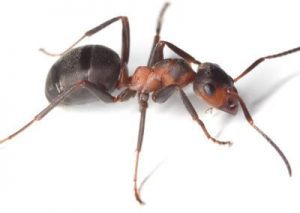
Facts, Identification & Control
Carpenter Ant Distinctive heart-shaped abdomen when viewed from above. 1/8- to 1/4-inch; black, dark brown, or red and black.
Like carpenter ants, acrobat ants prefer to nest in moist or rotted wood. Colonies are most often found in tree holes, dead limbs and rotting areas in fences, decks and railings. Indoors, nests may be located where water damage has occurred, in decayed or damp wood or inside insulation wall panels and wall voids. When disturbed, acrobat worker ants run with their abdomens held high over their heads.
They feed on a wide variety of foods, but the workers are partial to the sweet honeydew produced by aphids, scales and mealybugs. Most indoor acrobat ant control problems are the result of workers looking for food.
Carpenter ants are one of the most difficult pests to eradicate. Some infestations can take considerable time and repeated treatments to completely be rid of these destructive pests. Finding and treating all the nests with suitable pest control products and eliminating conditions that made the home a host habitat for the ants are the two key steps for successful carpenter ant control. Professional pest control specialists are best at handling extermination as improper methods are often ineffective and increase costs.

“Take care of the customers you have, and you’ll always have customers to take care of!”.
Your satisfaction is our goal. If you aren’t completely satisfied, we will work with you until you are.
Terry Teague - President of Extermital.